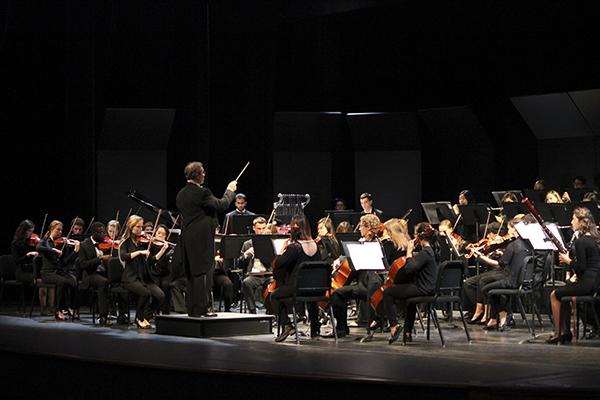It costs to hang out with the GW Orchestra.
The GW Orchestra charged concertgoers for tickets for the first time in recent history at a concert last month in Lisner Auditorium. Orchestra members said the proceeds did not go to the music department, but instead went to the venue.
Tickets cost $10 for students and $15 for audience members outside of the University community. Lisner Auditorium charges a fee to use the space, which can lead those using the space to charge attendees for events.
Peter Reiss, a member of the orchestra, said musicians and concert attendees were “not happy” with the extra cost to the concerts. Before this semester, the music department had held most of its concerts in other locations on campus, like recurring concerts in Phillips Hall, at no charge to attendees.
“If the money had gone to the orchestra to buy new equipment or music, then I wouldn’t have a problem with it, and the same goes for the band. The money isn’t going to the band to buy instruments. It’s going to the auditorium to make more money,” Reiss said.
Reiss said that even with the cost to attend a show, he thought the same number of people attended last month’s concert as they did last year.
He said the music department is still holding some free and more informal concerts and some have discussed moving next semester’s concerts to a location where tickets would be less expensive or free.
The music department faced serious budget constraints last year. Forty percent of its budget was slashed, which led to music classes only being offered to music majors and minors.
GW is not the first college or university to charge a small fee for top student performances, and the added ticket price brings GW in line with other universities, Robert Baker, an assistant professor of music and director of performance study, said.
“It has been a long-standing practice at many other colleges and universities to charge a nominal ticket fee for their premiere student performances,” Baker said in an email. “After an assessment of these practices, the department has decided to institute a nominal charge for some of our premier student concerts and performances.”
He added that the department will provide each ensemble member two complimentary tickets so they can invite guests to performances.
Peter Fraize, a faculty member in the music department, was the jazz area coordinator before that position was eliminated due to budget cuts. Fraize said charging students to come to performances could negatively affect the department’s success. He added that other music students should be able to attend concerts free of charge.
“It’s a huge negative, if you ask me, to charge students to come and hear their peers perform,” Fraize said.
Other performing groups within the music department also charge for concert tickets. The dance department generally charges between $10 and $20 for performances held in locations across campus including the Betts Theatre. Acapellapalooza, which was held in Lisner Auditorium this year after being held in the Marvin Center last year, charged for its tickets but donated its revenue to Miriam’s Kitchen.
Gisele Becker, an adjunct faculty member and director of the choral music program, said the choir stopped charging for tickets to increase attendance about 10 years ago. She said she feared adding a cost to music performances would again decrease the number of attendees.
“My understanding is that the music department considers our performances worthy of charging a fee. That’s the good part,” Becker said.
Ellie Smith contributed reporting.







